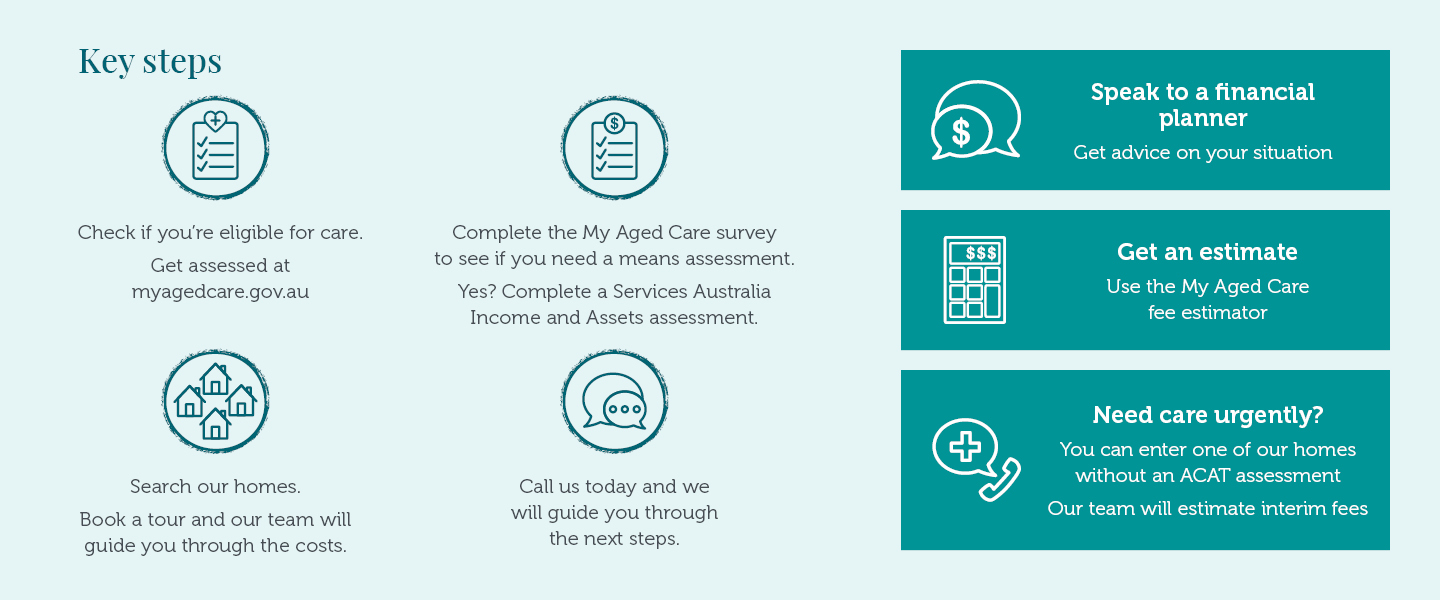
Aged Care Costs
We’re here to help guide you through the different costs when moving into one of our residential aged care homes


How much will residential aged care cost?
Moving into a residential aged care home is a big decision and it’s important to have an understanding of the different fees and charges you may need to pay. This is dependent on the aged care home you choose, the level of care you need, the services available and your individual ability to pay for these.
Services Australia (formerly The Department of Human Services) assesses and determines your financial circumstances and your ability to pay for your required aged care services.
We recommend seeking independent financial advice when you start looking to move into a residential aged care home to understand your situation and the best payment option for you.
If you’re looking for other aged care services such as home care support, you can visit My Aged Care.
Aged care costs can be broken down into three areas
Care
Care costs relate to clinical care you will receive while living in an aged care home and can be partially or fully funded by the government.
The costs will depend on the level of care you need (determined by a care assessment), and your ability to contribute to the cost (determined by a means assessment).
If you’re required to contribute to care costs, it’s called a means-tested care fee and it is a daily fee.
If required to contribute to this, it’s a daily fee.
Accommodation
Accommodation costs depend on the specific home and room you choose. The amount you contribute towards accommodation costs is assessed by Services Australia following a means assessment.
Depending on your means assessment, if you are required to pay for your accommodation in full or contribute to the cost, there are several options available.
Living
Living costs are for a range of services you can access once you’re living in a home. These include all day-to-day services like meals, laundry, cleaning and lifestyle activities and a set of additional services, called EstiaPlus which our homes offer.
Everyone pays the basic daily fee, which is set at 85 percent of the single person rate of the basic aged pension and any other fees the home charges. Additional services are charged as an additional daily fee.

Residential aged care costs are dependent on each person’s circumstances
If you are moving into an aged care home long-term, the fees you pay will be determined by your individual financial circumstances. This will be assessed by Services Australia by completing an Income and Assets assessment. Based on the outcome of this means assessment you may fit into one of these three indicative scenarios.
Scenario 1
My assets are below $61,500 and my income is below $33,735.
You're assessed as being of low means and eligible for full government support for your required care and accommodation.
You are likely to pay:
• The basic daily fee: set by the government at 85 percent of the single person rate of the basic aged care pension
• EstiaPlus: additional living services
You are unlikely to pay:
- Accommodation cost
- A means-tested care fee
Scenario 2
My assets are between $61,500 and $206,039. My income is between $33,735 and $84,232.
You're assessed as having some means and are also eligible for partial government support for your required care and accommodation.
You are likely to pay:
• The basic daily care fee: set by the government at 85 percent of the single person rate of the basic aged care pension
• EstiaPlus: additional living services
• Accommodation contribution
• Means-tested care fee* : you may need to pay a small means-tested care fee depending on your means assessment. This fee is capped annually and the government will fund anything above this cap
The amount you’re required to contribute to your accommodation and means-tested care fee will be determined by Services Australia.
* Means-tested fee: this is regularly re-assessed by Services Australia and you may change if your financial circumstances change
Scenario 3
My assets are over $206,039 and my income is over and $84,323.
You are determined as having the means to pay for your accommodation and may have to contribute to the cost of your care as a self-funded person.
You are likely to pay:
• The basic daily fee: set by the government at 85 percent of the single person rate of the basic aged care pension
• EstiaPlus: additional living services
• Accommodation payment
• Means-tested care fee: you may need to pay this fee depending on your means assessment. This fee is capped annually and the government will fund anything above this cap.
The amount you’re required to contribute to your accommodation and means-tested care fee will be determined by Services Australia.
*Means-tested fee: this is regularly re-assessed by Services Australia and you may change if your financial circumstances change
All case studies are indicative scenarios based on examples of a potential resident in an Estia Health home but not an actual resident. Scenarios are based on the current set fees by the Government at September 2021.
Some topics that might be helpful
Frequently asked questions
-
Are respite care costs the same as long-term care costs?
No, if you’re accessing respite care, you will only be required to pay the basic daily care fee and any additional living costs including our EstiaPlus fee for additional services provided over the standard services already available. You will still need to complete a respite resident agreement.
-
Can I move into an Estia Health home without a means assessment?
Yes, you don’t need to wait for your means assessment to be completed to move into our homes. Contact our client relations team on 1300 682 833, who will support you in determining interim fees while you wait for the outcome of the assessment, which can take anywhere from two to six weeks.
-
Do fees change over time once I'm a resident?
Fees can change for a number of reasons:
• If your income or assets change, then your means-tested care fee and accommodation contribution can change
• If you have a change in your personal circumstances: for example if a protected person moves out of your family home then your means-tested care fee and accommodation contribution can change
• If your care needs change, for example if the clinical care you require increases and your means assessment shows that you can contribute more, your means-tested care fee may go up -
What happens to my Refundable Accommodation Deposit (RAD) when I leave aged care?
The RAD will be fully refunded to you or your estate, less any amounts that he/she has agreed to draw from it to pay other aged care fees.
-
What do I do if I have already completed means assessment?
Following the assessment, you would have received a fee advice letter and this is valid for 120 days unless there’s a significant change in your circumstances, you can still use this.
-
I’m a Veteran, do the same fees and costs apply?
As an Australian Veteran, the Department of Veteran Affairs (DVA) will support you in completing your means test and income and assets assessment to ensure all information is correct and up to date before you contact My Aged Care. They can also support you with accessing short-stay respite care. The DVA only provide low care needs, with residential aged care provided by the Australian Government.
-
Who is a protected person?
When referring to aged care, a protected person is:
• A partner or dependent child
• A carer who is eligible to receive an Australian Government income support payment and who has lived in your home with you for the past two years
• A close relative who is eligible to receive an Australian Government income support payment and who has lived in your home with you for the past five years
• If your family home is occupied by a protected person when you move into an aged care home, it may not have been counted as an financial asset in the means assessment. -
Should I appoint a representative?
If you, or a loved one, need or are receiving aged care services, it can be helpful and sometimes necessary to have a representative. This is someone you appoint to speak and act on your behalf. They can register on My Aged Care on your behalf and complete the necessary paperwork. This can be a family member, friend, carer or advocate, like the Older Person’s Advisory Network (OPAN).



